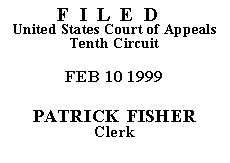

| UNITED STATES OF AMERICA,
Plaintiff-Appellee, Defendant-Appellant. |
No. 98-1153
(D.C. No. 97-CR-386-B) (Colorado) |
Pedro Ayala-Mendoza was arrested after accepting a controlled delivery of over four and a half kilograms of methamphetamine. He was charged in a one-count indictment with conspiracy to possess with intent to distribute methamphetamine in violation of 21 U.S.C. §§ 841(a)(1); 841(b)(a)(A); 846. Mr. Ayala-Mendoza, through his appointed counsel, entered into a plea bargain under which he pled guilty to the charged conspiracy. The government agreed not to oppose the application of the "safety-valve" reduction under U.S.S.G. § 2D1.1(b)(4) and not to oppose Mr. Ayala-Mendoza's request to be sentenced at the low end of the applicable guideline range.
In sentencing Mr. Ayala-Mendoza, the district court found that Mr. Ayala-Mendoza's criminal history of category two over-represented the seriousness of his prior record and departed downward to category one pursuant to U.S.S.G. § 4A1.3. The court then found that Mr. Ayala-Mendoza met all the criteria of the safety valve provision and sentenced him to eighty-seven months, the low end of the then-applicable guideline range, rather than the mandatory minimum of 120 months that would have been required without the downward departure.
Mr. Ayala-Mendoza filed a pro se notice of appeal in which he notified the court that irreconcilable differences made further representation by his appointed trial counsel impossible and that he had filed a grievance against that counsel with the state grievance committee. New counsel appointed to represent Mr. Ayala-Mendoza on appeal filed a brief pursuant to Anders v. California, 386 U.S. 738 (1967). Anders holds that if after conscientious examination counsel finds a case to be wholly frivolous, he should so advise the court and request permission to withdraw. Counsel must in addition submit to both the court and his client a brief referring to anything in the record arguably supportive of the appeal. The client may then raise any points he chooses, and the appellate court thereafter undertakes a complete examination of all the proceedings and decides whether the appeal is wholly frivolous. If it so finds, it may grant counsel's request to withdraw. See id. at 744.
In his Anders brief, counsel raises two possible points, Mr Ayala's indication in his notice of appeal that he was not satisfied with his trial counsel and a challenge to his sentence. Counsel states his opinion that the appeal presents no non-frivolous issues and requests leave to withdraw as counsel. Mr. Ayala-Mendoza has not filed a pro se brief in response. Accordingly, we turn to an examination of the proceedings to determine if this appeal is wholly frivolous.
To the extent that Mr. Ayala-Mendoza's notice of appeal can be viewed as an assertion that his counsel was ineffective, the issue must be raised collaterally rather than on direct appeal. See United States v. Galloway, 56 F.3d 1239, 1240 (10th Cir. 1995) (en banc). We pointed out in Galloway that such claims brought on direct appeal are presumptively dismissible because most ineffectiveness claims need further record development. Id. Although we recognized that in rare instances the merits of an ineffectiveness claim may be reviewed on direct appeal because the claim needs no further development, id., that rare exception is clearly not applicable here. To the extent Mr. Ayala-Mendoza desires to raise ineffective assistance of counsel, therefore, the claim must be pursued in a collateral proceeding and is therefore dismissed.
We have carefully examined the record to ascertain whether any ground exists to support a challenge to Mr. Ayala-Mendoza's sentence. We note that Mr. Ayala-Mendoza received the benefit of both a downward departure and the application of the safety-valve provision, resulting in a sentence substantially shorter than that which would have been required otherwise. Indeed, the sentence was exactly that contemplated by the plea agreement. We find nothing in the record to indicate that the sentence imposed was in violation of the law or the result of a misapplication of the guidelines. Accordingly, we are without jurisdiction to consider the challenge. See United States v. Sanchez, 146 F.3d 796-97 (10th Cir. 1998); 18 U.S.C. § 3742(a).
After review of the entire proceedings, we conclude that the record establishes no non-frivolous ground for appeal. The appeal is therefore DISMISSED and counsel's motion to withdraw is GRANTED.
ENTERED FOR THE COURT
Stephanie K. Seymour
Chief Judge
*.This order and judgment is not binding precedent, except under the doctrines of law of the case, res judicata, or collateral estoppel. The court generally disfavors the citation of orders and judgments; nevertheless, an order and judgment may be cited under the terms and conditions of 10th Cir. R. 36.3.